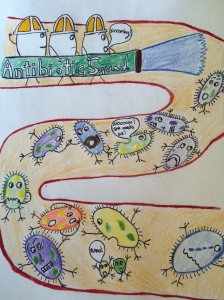No one knows better than I do the misery of sinus infections. Up until last year, I had always rushed to the doctor several times a year to combat them with antibiotics. Now after two sinus surgeries, my sinuses drain better than they did before and I have successfully beaten infections without pills. However, if I had been more proactive at the beginning of my sinus infections, I could have possibly avoided surgery, antibiotics, and this whole health mess altogether. I know how tempting it is to rush to urgent care and get a prescription for antibiotics, but I am here to support you and beg you to WAIT! Keep in mind that the option to go and get antibiotics will always be there, we are not in a shortage supply of antibiotics in the United States, in fact we have the exact opposite problem: antibiotic overuse. We live in a fast pace society of instant gratification. If we get sick, we go to the drug store to load up with decongestants so we can power through work. We go to the doctor if we’re not better in two days and bombard our body with antibiotics which may make us better instantly (or not in my case), but leave us with a host of side effects to deal with afterwards.
It’s no secret our bacteria are becoming increasingly resistant to antibiotics. We have started to create an uncontrollable monster of antibiotic resistant bacteria because the more we use antibiotics, the more bacteria become resistant to them. There have been several cases across the world and the in the United States where people have died or had serious life altering consequences from bacteria resistant infections. It is becoming a serious public health issue and one of the ways we stop this problem is stop rushing to the doctor the minute we feel we have any type of infection. In addition, sinus infections are not always bacterial, they could be viral or fungal. In fact a research study done by the Mayo Clinic showed that 96% of patients who underwent sinus surgery for chronic sinusitus had fungus in their infections. Ent’s (Ear, Nose, and Throat Doctors) often skip the process of doing the cultures and just want to do the surgeries to drain infections.
It is said that about 80% of your immune system is located in your gut. This consists of about 3 trillion bacteria residing in your intestines. If you extracted all your bacteria, it would be around the size of a basketball! Antibiotics wipe out all of this, which not only can cause digestive issues, but also hurts your immune system. After my sinus surgeries and many rounds of these lovely drugs, I promptly got tonsillitis a month later that took me months to recover from. My bacteria had started to become resistant to antibiotics and my immune system was so depleated it simply did not have the capacity to fight off infections like it had before. Currently all of my health issues stem from the side effects that antibiotics had on my stomach including fatigue, malapsorption, indigestion,acid reflux, Candida, SIBO, and leaky gut. Hipocrates had it right when he said, “All disease begins in the gut.” Therefore, it’s imperative you do everything you can to preserve and protect your stomach! It will affect your overall health greatly.
Lucky for us, there are so many other ways to address sinus infections! I am here to share the remedies that I have used and have worked for me. A great resource for natural remedies I have gotten many ideas from as well is http://www.earthclinic.com/ .

